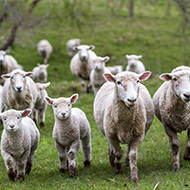New sheep flock tool to help improve vet-farmer engagement

The new Flock Health Checklist will help practitioners assess performance across three crucial time periods.
MSD Animal Health has announced a new checklist-based audit tool designed to help vets in practice connect more actively with sheep producers.
The organisation says that the new Flock Health Checklist will help practitioners assess performance across three crucial time periods and two key management processes impacting the success of sheep enterprises.
Kat Baxter-Smith, a veterinary adviser with MSD Animal Health, said: “We have developed this new performance checklist drawing on specialist sheep vet working experiences, clinical research studies, economic data and industry recommendations.
“For example, the pre-breeding period is a great time to make sure ewes and rams are as fit and healthy as possible. Good practice and preparation in this area will go a long way to minimising stress and problems during a busy lambing period.”
She said that the tool could also help with protocols for late pregnancy and lambing, and will help subsequent lambing seasons run smoothly.
The checklist incorporates an additional series of audit-based questions designed to pinpoint system strengths and weaknesses during growth, weaning and sale. It also enables a vet to answer a series od questions covering two key management processes: disease management and biosecurity; and how flock performance is currently monitored.
“Working through a series of 10 questions within each of the three crucial time periods and two key management processes – designed to tease out where a sheep unit is in terms of accepted best management practice – allows vet and farmer to quickly pinpoint any areas needing attention. What’s more, repeating the checklist every six or 12 months is a great way to keep things on track, allowing both parties to monitor performance against agreed targets,” said Dr Baxter-Smith.
“Similar types of checklist have been available to dairy youngstock rearing units and beef suckler herds for a couple of years now, with several vets reporting that these tools have proved integral to their productivity improvement work with farmer clients. Use of this checklist-based approach is also helping better implementation of preventative health practices such as vaccination. We hope this latest tool will help the GB sheep industry similarly.”
Further details about the tool are available from MSD account managers.



 The RCVS has announced a new version of its 1CPD mobile app, with enhanced features for veterinary surgeons and veterinary nurses to record their continuing professional development.
The RCVS has announced a new version of its 1CPD mobile app, with enhanced features for veterinary surgeons and veterinary nurses to record their continuing professional development.